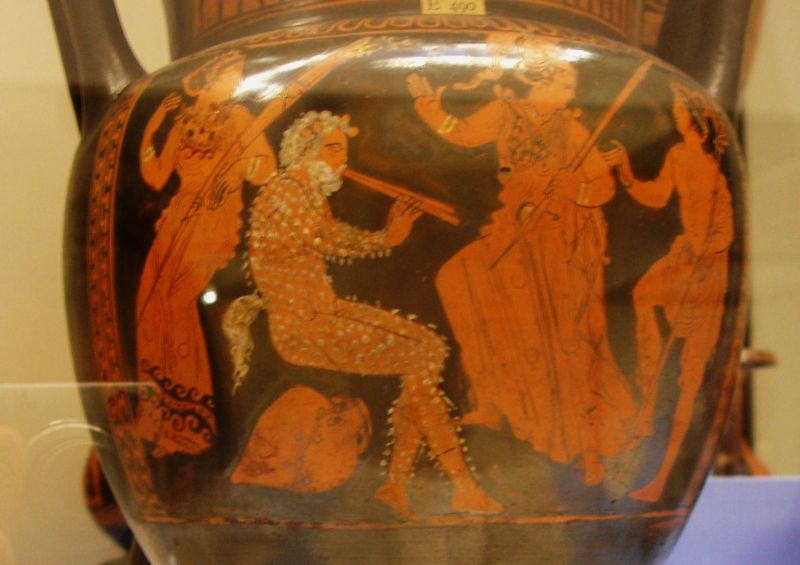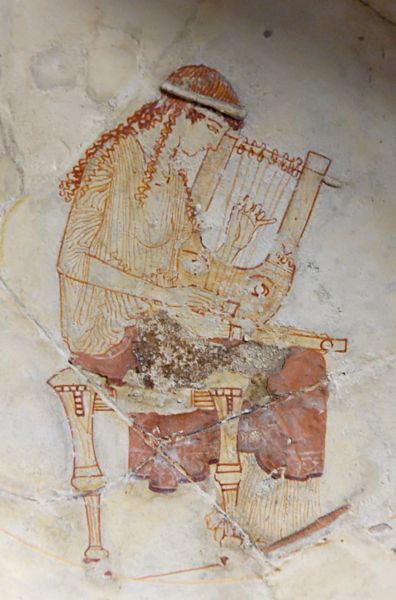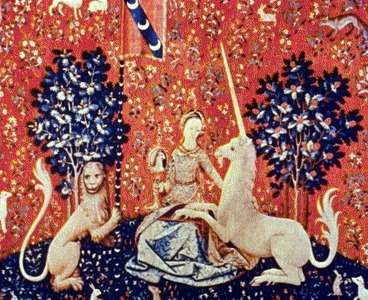Electricka is both humble and proud to introduce her colleagues,
the nine muses of ancient Greece. If you've already made their
acquaintance, bear with heryou may yet learn
something new.
the nine Muses
In ancient Greece, people believed that the
arts were inspired by musesgoddessessupernatural women who haunted, lured,
persuaded, or drove men to create great works of art. These muses were
personifications of an inspiration that seemed magical and unearthly,
guiding spirits through whose power one could create something new and wonderful.
The Greeks had nine muses:
- Calliope (She of the Beautiful Voice) Muse of epic or heroic poetry. Her other claim to fame is as the mother of Orpheus. She is said to be able to play any musical instrument. Her symbol is the writing tablet.
- Clio (Proclaimer) Muse of history. Her symbols are the laurel wreath
(standing for victory) and the scroll (containing records of athletic, poetic,
and military victories and other historic accomplishments).
- Erato (Lovely) Muse of love poetry and marriage songs. Her symbol is the lyre.
Her male counterpart is Eros, the ancient Greek god of love, the same
god identified by the Romans with Cupid. Her name stems from an ancient Greek
word that means of love, caused by love, or given to love,
the same word that is the origin of the modern English word erotic.
- Euterpe (Well Pleasing) Muse of music and lyric poetry. Her symbol is the flute. She is said to have invented the flute and other wind instruments.
- Melpomene (Songstress) Muse of tragedy. Her symbol is the tragic mask.
- Polyhymnia (She of the Many Hymns) Muse of sacred song
and dance and poetry, oratory, singing, and rhetoric. Her symbol is the veil.
- Terpsichore (Whirler of the Dance) Muse of dancing, which she is said to have invented. Her symbol is the cymbal.
- Thalia (Luxuriant) Muse of comedy and
idyllic poetry. Her symbol is the comic mask.
- Urania (Heavenly) Muse of astronomy. Her symbol is a globe and a pair of compasses.
More
About Electricka and her cohort
muses
Who's Electricka? Her full title is Electricka, Muse of the WorldWide
Web©. She and her cohorts are today's counterpart of their Ancient Greek
sisters, the muses. Electricka and her cohorts are descended from the muses of ancient Greece; they, too, have a royal inheritance. they help bring the ancient muses up to date.
One of Electricka's cohorts is The Muse Of Music. Her counterpart in
ancient Greece is Euterpe. Explore the ancient muses and their relation to
music further on this page, below.
Electricka and her muses have other counterparts in ancient Greece.
- For more about Electricka, Muse of the WorldWide Web©, visit the page
called Introducing Electricka:
click here.
- For more about Electricka's cohort muses, visit the page called About
Electricka's Web Site and take Electricka's Orientation Tour:
click here.
 About Ancient Greek muses and music
About Ancient Greek muses and music
The ancient Greeks thought so highly of music, they dedicated a
muse to it. That's quite a compliment, considering the high
regard in which they held muses. Her name is Euterpe, which means Well Pleasing.
Euterpe is the muse of music and lyric poetry. Her symbol is the flute. She is
said to have invented the flute and other wind instruments. (Look for
the flute in the picture of the ancient vase, above.)
They couldn't stop there. Erato, which means the Lovely,
is the muse of love poetry and marriage songs. they equated music with love
and the marriage bed. They gave her the lyre as a symbol. It seems that
music was a preoccupation with them. (Look for the lyre in the
wall adornment at the left.)
Notice the muse in music. The Muse Of Music proudly points out that
the modern English word for music
is ultimately derived from a combination of the Ancient Greek word for
music
and the Greek expression, art of the Muses. To the Greeks, music
was the art of all arts, the art of the muses.
Relating muses and art of the muses to come up with the
modern word music makes sense. The Greeks identified their muses with
the arts and the art of music with their muses. That identification is high
praise for music as an art form; it positions Euterpe as the "most equal"
muse of all the coequal ancient muses. In the same way, that identification
from Ancient Greece positions Electricka's Muse Of Music as the "most equal" muse of
all the coequal modern cohort muses.
By this reckoning, all the muses, ancient and modern, owe The Muse of Music a special debt of gratitude, Electricka
included.
What do muses and museums have in common?
In ancient Greece a place that was devoted to learning was a sacred
place, a place where muses reside. Therefore, in ancient Greece, any place devoted to learning
and the arts was called a museuma muse
place!
Museumsall museumsare places sacred to
the muses. When you visit a museum, you enter a holy place, one sacred to
the gods!
- Explore the connection between muses and museums at the page called
About Muses And Museums:
click
here.
etymology and the muses
In classic mythology, a Muse was any of a number of sister goddesses:
Aoede (song), Melete (meditation), Mneme (memory), and especially any of the
nine daughters of Zeus and Mnemosyne who presided over the arts that are
noted above on this page. Since then, the word muse has come to refer
to just the nine daughters described above.
The word museum was in use in ancient Greece
and Rome, where it referred especially to the scholarly institute founded in
Alexandria about 280 BCE. It was absorbed into English early in the
seventeenth century.
In the fourteenth century, as a verb the word muse meant to gaze
meditatively or wonderingly, a meaning that's now archaic. Archaically, in
Middle English the word amuse meant to keep in
expectation by flattery or pretense.
Since the fourteenth century, as a verb the word muse has come to
mean to think silently, to meditate on, to gaze meditatively, and to comment
thoughtfully. And in the modern world, the word amuse
has come to mean to hold someone's
attention, please, entertain, divert, cause mirth, and to cause to pass the time
agreeably.
It seems obvious that the various ideas, arts, concepts, emotions, and
principles that the ancient Greek muses
stand for inspired a number of derivative words, ancient and modernwords
such as meditation, memory, muse, museum, and amuse.
Hats off to The Muses!
ETAF recommends
...Coming.





